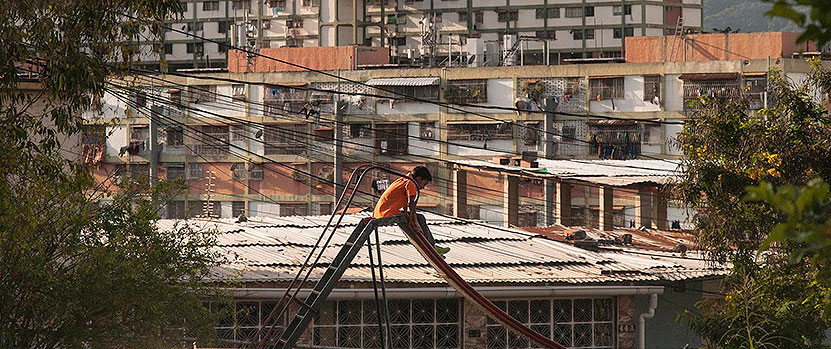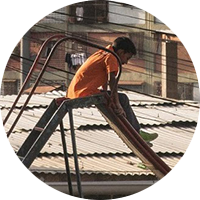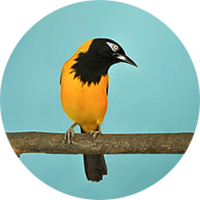Think
History, a teacher of hope
Diego Manrique, student , 4th year Philosophy and Law student, reflects on the importance of making a country's history, in his case Venezuela's, his own.
of making the history of a country, in his case Venezuela, our own. In what sense does history challenge us?
Is it just a question of looking backwards? Hope is what enlightens us in the midst of
The value of past experiences lies in the fact that they are lessons, they teach.
they are lessons, they teach".

Eneas de Troya, "The Conquest of Caracas" (January 23), 2016, Flickr
(excerpts distributed by the publication)
However, on reflection, I believe that the decision to emigrate is appropriate as long as (...) one conceives of studies as a pure collection
appropriate as long as (...) one conceives studies as a pure collection of information.
of information. But if one is concerned with truth, one should rather look for it within oneself and in the world to which one
rather within oneself and in the world into which one's destiny has thrown one. Whoever does not
If one does not make that attempt, one will hardly find it anywhere else.
is it not rather a matter of fleeing from truth than of embarking on a journey in search of it?
Václav Havel, Letters to Olga, Galaxia Gutemberg, Barcelona, 1997
To talk about any topic it is necessary to know it, at least a little. To know, in turn, means to carry the topic within oneself, even though it may be far away from the speaker, as when one speaks of a place one has visited. On this occasion, I would like to talk about my country, Venezuela. Even at a distance, thinking about it financial aid makes me keep it in mind, to continue loving it, because one stops loving as one begins to forget. However, these lines are not great disquisitions, nor do they pretend to be. They are, rather, the reflections of a Venezuelan trying to understand and think a little about his homeland, which he loves so much. In any case, writing them down will always help to think about them better, and if I manage to tell you something with these lines, I will be satisfied.
A few years ago, while talking with two friends about the Venezuelan situation, a young man, who was listening to us attentively, came up to us and said: "I honestly don't know why they talk about Venezuela if it's always the same thing, it's a waste of time. It's a waste of time. The best thing to do is ignore topic". Although I found his comment somewhat obnoxious, over time that boy became a very dear friend. After his interruption, I seem to have asked him - very subtly - what he had come to do then. If the matter was a waste of time, why didn't he ignore it? However, in his apparently disinterested question, I thought there was a certain uneasiness: do some people still care to talk about the country?
Faced with a decline like the one we have been living through, for many Venezuelans the discouragement is reasonable, even legitimate: the country has lost the path of democracy and this has endangered the republic. "What did I do to live in a country like this? After all, I didn't vote for Hugo Chávez", "Where is the dreamlike Venezuela that my parents and grandparents told me about", many will have asked themselves. At final, why, if things could be otherwise, are they the way they are and not different ?
As with such profound questions, expecting a precise and clear answer is little more than an illusion. There are too many elements behind the historical changes in a society to try to reduce them to voting. Democracy has more to do with a mentality than with getting up early to vote. However, if we take a quick look at the last twenty years, it seems that part of our problems have been, on the one hand, submit the reins of the country to the wrong people and, on the other hand, not taking them away in time. Perhaps we are (partly) responsible for having been indifferent. However, looking back will always shed light on our present. The value of past experiences is that they are lessons, they teach.

Since I was a child I have always been interested in the history of my country. I had an uncle, my mother's older brother, who would visit me and talk to me about the Wars of Independence, the French Revolution and the World Wars. For a young child, being told stories in a passionate way is far more enriching than any video game. Perhaps that is why many children like to be read bedtime stories by their parents, as my mother used to do: stories tell of experiences, they are little stories made their own. As I grew up, I began to research, very briefly, about my country. The presidents we had had, the names of the different periods, famous people, our squares, and so on. It was a kind of jigsaw puzzle: I was putting the pieces together to get the whole picture.
Already at university, the opportunity to read some essays was colouring the image I had of the country. I was beginning to understand. I realised that some of our problems are the disregard for our real achievements and the exaltation, on the contrary, of our failures. Like the usual predilection for heavy-handed, military rule, rather than the council of wills that civilian government inspires. The ease with which we discredit our democratic period, in praise of the dark five years of the military dictatorship of Marcos Pérez Jiménez. This speaks to us of a country that views itself with great scepticism, perhaps because it believes itself incapable of achieving great triumphs, even though our history proves otherwise. Let us not forget that we did indeed have a truly democratic coexistence. That's right, we did, which should make us understand that we can have it again.

On the contrary, the current (mis)government, with the disaster to which it has led the country and the brutality with which it acts, seems to be betting on us having a pessimistic view of ourselves: that we cannot change our lamentable situation. It would be to agree with him, and thereby reduce the value of so many lives lost in the struggle for the country's destiny, to consider that we are incapable of putting ourselves in order as a society. In the end, what subject Venezuelans we want to be is at stake.
Of course, it is not a crime to ignore history. However, knowing it will help me to be discerning and to think for myself, because ignorance makes us easy prey to deception. If I know the history of my country, I can judge, I can pronounce myself on its present. Thus, the study of history reveals itself to me as a tool to help me to work towards the future. It gives me perspective. In the same way that knowing something makes it my own, knowing the history of a country allows us to feel truly responsible for it, to make it our own, to love it more deeply.
History is a teacher of hope. It looks to the past and to the future. Towards the past, because it teaches us that life is always moving forward, that periods come and go, that there are no perfect societies or untouchable systems. It makes us recognise the fragility and imperfection inherent in any human work. It might suggest that the edifice of our country is always in need of maintenance. However, it will not be enough just to maintain our building, it is not a museum piece that requires preservation work and nothing more. As a result of the fragility of our works, we must consider it our responsibility to continue building, block by block, the edifice of our nation. That is why history is also projected into the future, because hope opens up possibilities. Just as there are no closed roads in a person's life, it is always possible to straighten the lost course.
Knowing our mistakes financial aid us to change them, but first we have to recognise them as such. It would not be a question of wiping the country's destiny from time to time, as Mario Briceño-Iragorry warns, of wiping the slate clean, of starting national history from scratch. Knowing history, then, is an invitation to become true makers of the country. Not only a people that does not know its history is condemned to repeat it, according to George Santayana's famous phrase. A people that does not know its history can also make it worse.

Paolo Costa Baldi, Venezuelan Troupial - Icterus icterus






